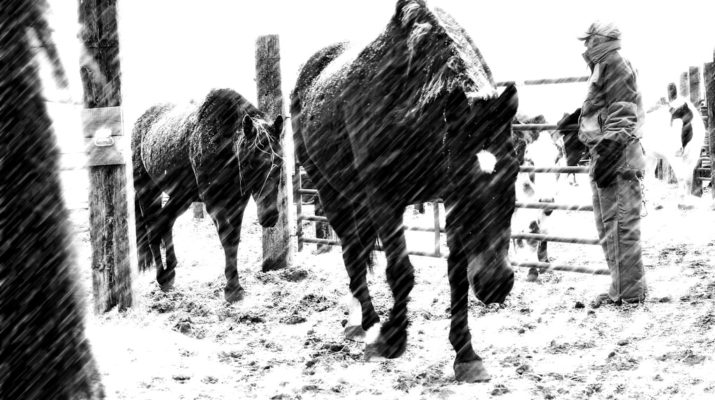We’re at that time of year when it just takes longer to get chores done every day, but it is time well spent. Buzz, the reliable canine chore assistant seems a bit perturbed as he waits somewhat patiently by the door as we pull layers of jackets, wool socks and ear-covering insulated caps out of the closet each and every time to head outside to check waterers and throw a sufficient amount of hay to the horses. To a dog, this process must appear to be an unnecessary task that only manages to take away from the running through the corrals and chasing birds time he always looks forward to. While we weak and puny humans, with our minimal amount of body hair, generally don’t think twice about layering so thick that we can barely bend over and pick up the pitch fork should it slip from your mittens, this time of year offers unique opportunities to slow down and appreciate the conditions that winter presents.
When the cold persists for more than 48 hours the horses slow down in their activities and seem to be trying to conserve body heat. During these times you can walk among the herd at a much more relaxed pace, making meaningful contact with the horses as you pass through the crowd. They are less interested in following you around and are content to watch you from a distance. Now is the perfect moment to stop yourself and return the gaze; as humans there is always a nagging persistence feeling like you’re not getting something done unless you can check something off the to-do list. Take a lesson from the horses and add “Be in the moment” to the to-do list if this will help you sleep at night.
When the temperature drops even further, as it tends to do in January, learn to listen to the crunching of the snow under your boots. After all, this only happens for a short time once a year. Listen to the horse’s hooves crunching and take an extra second to look at their feet to see if they are getting balled up with ice and snow. To alleviate tendon strains and other possible injuries, help out your equine partners by keeping their hooves as clean as possible with your hoof pick. Look at it as another chance to deepen the relationship with your horse through physical contact and basic care. When it gets very cold the sounds in the air change also. Distant sounds appear to be in a lower register. This is true with the horses as their vocalizations and breathing become more distinct and audible.
The good news is that the banana belt environment around Alliance will grant a reprieve from the deep cold occasionally making it much more tolerant. As you might relate, when the sun shines again and the temperature climbs to a relative warmth, the horses enjoy this brief relief and will rush to the pasture for some grazing and leg stretching recess. Another lesson from the horses is to enjoy the present moment and make the most of it. They don’t look at their devices and see the weather forecast for the next week; horses simply love the vitamin D as it thaws the snow off their fuzzy backs. When the next cold front takes a hold, they don’t complain but instead deal with it and take what comes in an unshakeable steadiness. Yet another way that emulating a horse can make you a better human. At EPH we’ve learned to accept all the seasons throughout the year (like we have a choice) and have learned to identify what makes them special and worth enduring, uh sorry, enjoying. If you’d like to learn some life lessons from the horses, contact EPH at (308) 762-3848 of eph@bbc.net.

